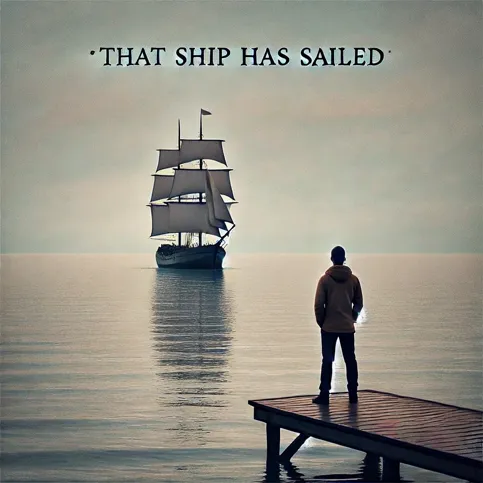What is the meaning of the phrase ‘that ship has sailed’?
That opportunity has already passed; it is too late to do anything about it now or possibly ever again.
What is the origin of the phrase ‘that ship has sailed’?
The phrase ‘that ship has sailed’ is a relatively old one likely rooted in the era of sailing ships before the widespread use of steam and diesel-powered vessels in the late 19th and early 20th centuries.
The literal origin relates to the nature of maritime travel. Sailing ships were limited in terms of when they could set sail and of course, how fast they could go. For an ocean voyage, the sailing ships would have had to wait until just after high tide before setting out, because that way, they would get the benefit of riding the retreating water as the tide ebbs. Of course they would have also had to wait for the wind to be blowing in a helpful direction.
All this means that once a sailing ship has set sail, it won’t be coming back anytime soon, because the tide’s conditions wouldn’t allow it. In fact, you’d usually have to wait six hours or possibly more to ride the rising tide back in towards land. Moreover, if the winds weren’t favourable for a return journey either, then may have to wait several days.
The meaning of the phrase expanded over time to be used figuratively to mean that it’s far too late to return to the previous circumstances, and too much time has passed to be able to rectify an issue. The phrase is often used to convey finality and the acceptance of missed opportunities.
How is the phrase ‘that ship has sailed’ used today?
Today the phrase is commonly heard in everyday conversation, in public discourse, in literature and writing, and in TV and film. For example, in the book “The Language of Flowers” by Vanessa Diffenbaugh published in 2011, the protagonist uses the phrase to reflect on past decisions and opportunities that are no longer available, emphasising the theme of lost chances and moving on.
Similarly, the saying is also used “The Pursuit of Happyness” released in 2006 when the main character in the film uses the phrase to accept that a certain opportunity is no longer achievable, adding to the film’s theme of perseverance despite setbacks.

